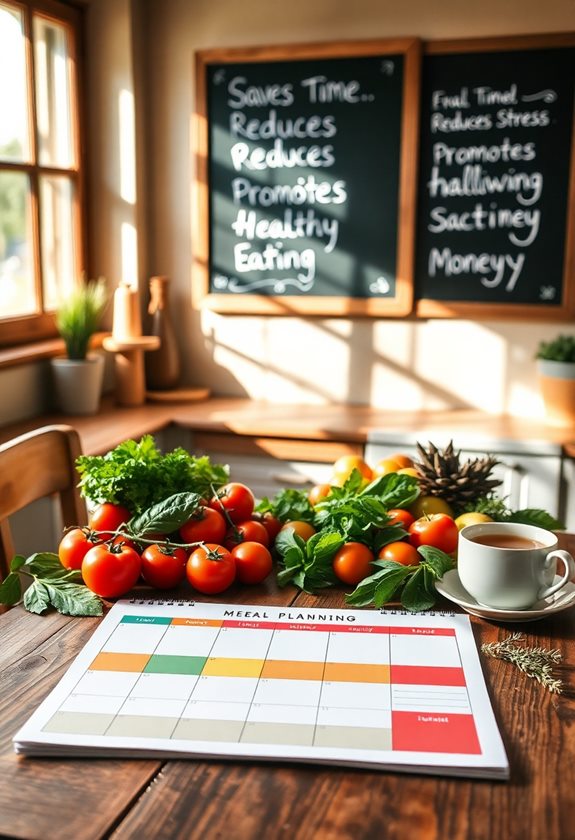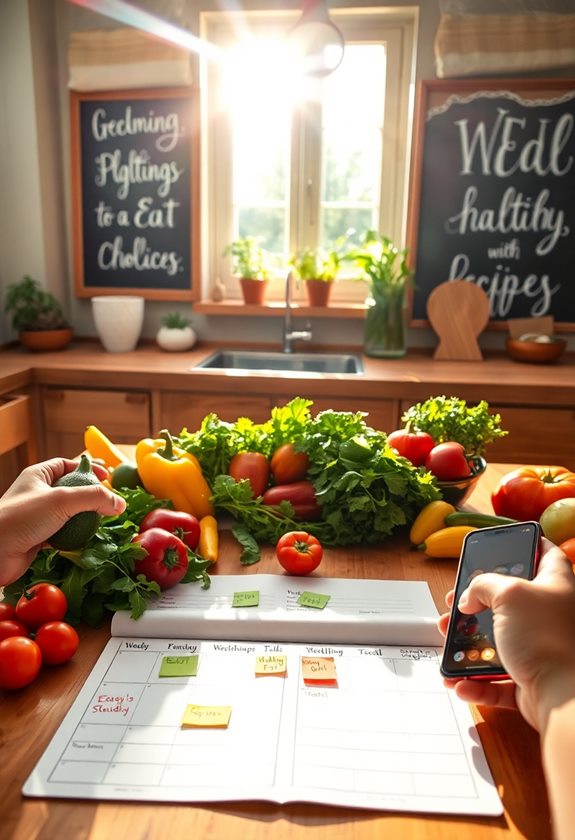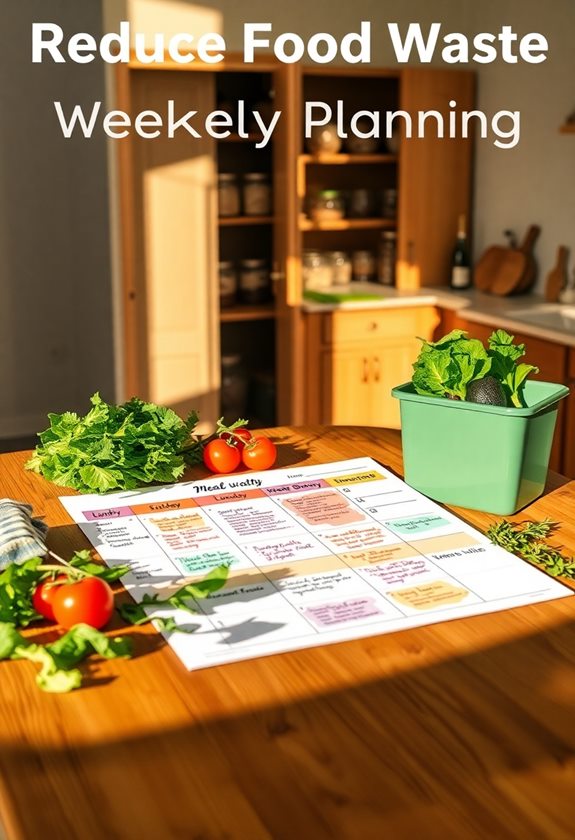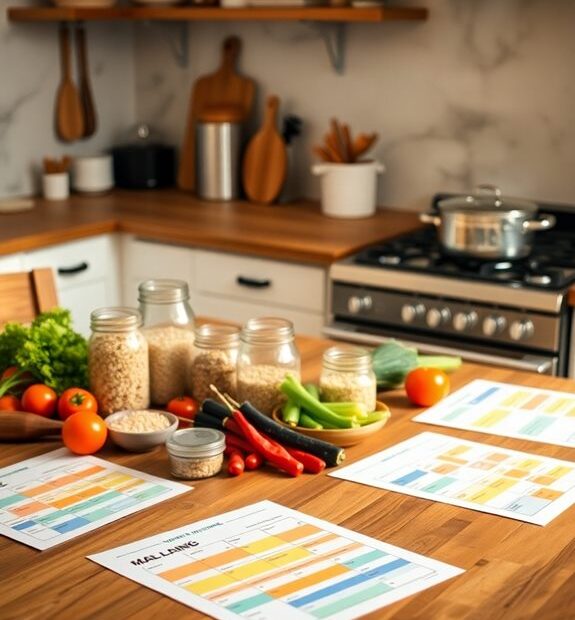Using weekly meal planning templates makes life easier and more fun in the kitchen! Have you ever stared at your pantry, unsure of what to cook? With a meal plan, you can save time and reduce stress by knowing exactly what to prepare each day. Plus, it helps guarantee balanced meals, encourages trying new recipes, and keeps you from overspending at the store. You'll also waste less food! Don't you want to enjoy cooking instead of feeling rushed? 🤸♀️ With these tips, you can enjoy more family time and less chaos, and there's more to discover in the world of meal planning!
Key Takeaways
- Weekly meal planning templates enhance organization, making it easier to prepare balanced meals throughout the week.
- They save time by eliminating daily meal decision-making and providing a clear shopping list.
- Meal planning promotes healthier eating by ensuring balanced nutrition and reducing processed food consumption.
- It helps manage budget by establishing spending limits and encouraging bulk buying of essential items.
- Utilizing templates reduces food waste by promoting efficient use of ingredients and encouraging creativity with leftovers.
Benefits of Meal Planning Templates

Meal planning templates can transform your weekly routine, making it easier to stay organized and eat healthier. Have you ever found yourself staring at a fridge full of food, unsure of what to make? With a meal planning template, you won't face that problem again! You can jot down meal ideas for the week ahead, ensuring you have everything you need.
One major benefit is that templates help you save money. By planning meals, you'll buy only what's necessary. This means fewer impulse buys and less food waste. Plus, you can create balanced meals that include all food groups, keeping you energized.
Another advantage? You'll enjoy variety! Sticking to a template allows you to explore new recipes and ingredients, making mealtime exciting. Why eat the same thing every week when you can try something new?
Lastly, meal planning reduces stress. Knowing what you'll eat each day takes the guesswork out of cooking. Imagine coming home and knowing exactly what's for dinner! 🌟 With a little effort upfront, you'll reap the rewards all week long. So, why not give meal planning templates a try? You might just love the results!
Time-Saving Advantages
Planning your meals not only promotes healthier eating but also saves you valuable time throughout the week. Have you ever found yourself staring into the fridge, unsure of what to make for dinner? With a meal plan, you can skip those moments of frustration.
When you set aside time to plan your meals, you can create a shopping list that covers everything you need. This means fewer trips to the store and less impulse buying. You'll be amazed at how quickly you can whip up dinner when you know exactly what you're making. Plus, having meals prepped in advance means you can easily grab something healthy instead of reaching for takeout.
Imagine saving time on busy weeknights! You can spend those extra minutes with family, catching up on your favorite show, or even enjoying a hobby. Isn't that a better way to unwind?
Improved Nutrition Choices

Having a well-structured meal plan can greatly enhance your nutrition choices. When you take the time to plan your meals, you're not just saving time; you're also making healthier decisions. Have you ever felt lost in the grocery store, unsure of what to buy? A meal plan helps you know exactly what you need, reducing the chance of impulse buys.
Here are four ways meal planning improves your nutrition:
- Balanced Meals: You can guarantee every meal has the right mix of proteins, carbs, and fats.
- Portion Control: Planning helps you serve the right amounts, preventing overeating.
- Nutrient Variety: You can include different foods each week, assuring you get a range of vitamins and minerals.
- Less Processed Foods: With a plan, you're less likely to grab unhealthy snacks or fast food when you're busy.
Budget-Friendly Strategies
When you're trying to eat healthier on a budget, it might feel overwhelming, but you can make it work without breaking the bank. Start by setting a weekly budget for groceries. This will help you make smart choices. Have you ever noticed how sticking to a list can save you money? By planning your meals, you'll only buy what you need, cutting down on impulse purchases.
Buy in bulk when you can. Items like rice, beans, and oats are often cheaper in larger quantities. Plus, they're versatile! You can use them in various meals throughout the week.
Seasonal produce is another great way to save. Fruits and veggies in season are usually less expensive and taste better! Have you tried shopping at local farmers' markets? You might find amazing deals there.
Lastly, consider making meatless meals a few times a week. Beans, lentils, and tofu are not only budget-friendly but also packed with nutrients.
Reducing Food Waste

Reducing food waste is essential for both your budget and the environment. When you plan your meals, you can make sure you use what you buy. It's a win-win situation! Here are some simple tips to help you cut down on waste:
- Make a shopping list: Write down only what you need for the week. This helps you avoid impulse buys that might go bad before you can use them.
- Check your pantry: Before shopping, see what you already have. You might be able to create meals using ingredients you forgot about!
- Store food properly: Learn how to store fruits and veggies so they last longer. Did you know some should go in the fridge while others shouldn't?
- Get creative with leftovers: Use leftover ingredients in new ways. For example, yesterday's roasted veggies can become a tasty frittata today!
Enhancing Cooking Skills
Improving your cooking skills can elevate your meal planning experience and further reduce food waste. Think about it: the more you cook, the better you get! When you use a weekly meal planning template, you can focus on trying new recipes and techniques. Isn't that exciting?
Start by picking a few simple meals you want to learn. Maybe it's a stir-fry or a homemade soup. Practice makes perfect! As you get more comfortable, you can experiment with flavors and ingredients. This not only builds your skills but also helps you understand what you love to eat.
Have you ever found yourself with leftover ingredients? With better cooking skills, you can whip up delicious meals from what you have on hand. For example, if you have some wilting veggies, toss them into a frittata! 🍳

